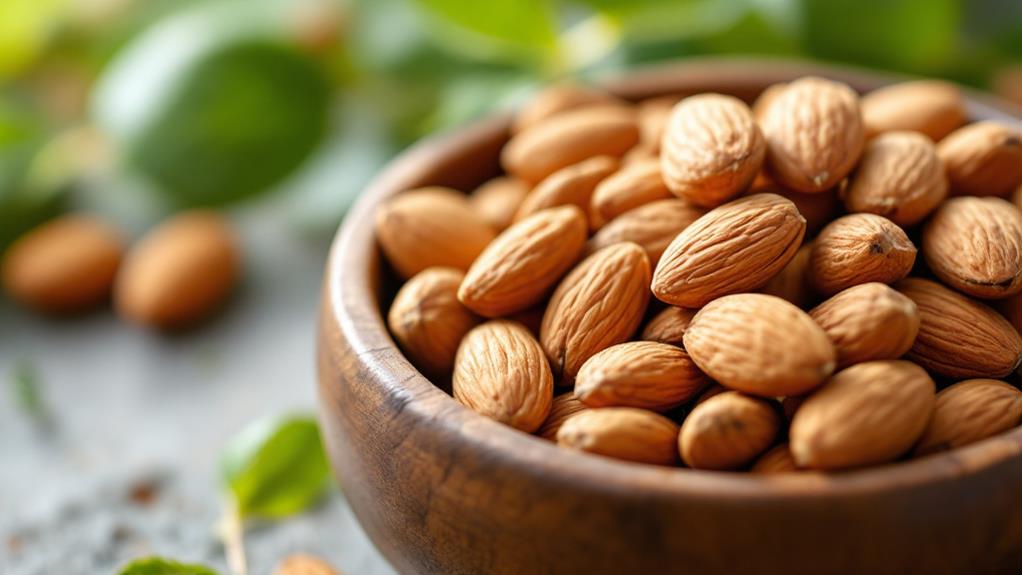Almonds: A Satiating Snack to Keep You Full and Energized

You can't beat almonds regarding staying full and energized. Packed with 6 grams of protein and 4 grams of fiber per ounce, they're a powerhouse for curbing hunger and providing steady energy. The healthy fats help maintain heart health while the low glycemic index keeps your blood sugar stable. Almonds not only keep your calorie intake balanced but also help manage weight by reducing cravings. A mid-morning snack of almonds can even lower your appetite for later meals. For tips on how different portion sizes can improve these benefits, just keep exploring more.
Nutritional Profile of Almonds
When you snack on almonds, you're choosing a food that's packed with nutrients. Almonds are known for their exceptional nutritional value, providing a robust mix of protein, fiber, and healthy fats. Just one ounce, or about 28 grams, delivers roughly 6 grams of protein and 4 grams of fiber. These components are key to their satiating properties, making you feel fuller for longer. Each almond has about 7 calories, so a typical serving contains around 160-170 calories, mostly from healthy fats that are beneficial for your body.
These tiny powerhouses are also rich in vital vitamins and minerals. Vitamin E and magnesium stand out among their nutrients, along with antioxidants that support your general health. Almonds have a low glycemic index, meaning they don't spike your blood sugar levels, which is excellent for blood sugar control and reducing the risk of diabetes. Additionally, regularly including almonds in your diet can improve heart health. The monounsaturated fats they contain play a significant role in lowering cholesterol levels, promoting a healthier heart. When you incorporate almonds into your routine, you're making a choice that supports your body's wellness.
Benefits of Almond Snacking
Snacking on almonds offers numerous benefits that make them a standout choice for curbing hunger and maintaining energy levels. As a nutrient-dense, healthy snack, almonds provide 6g of protein and 4g of fiber per ounce, enhancing satiety and reducing hunger levels. This combination of macronutrients is particularly effective for appetite control, helping you feel full longer and cutting down on unnecessary snacking throughout the day.
Research shows that enjoying a mid-morning almond snack can considerably lower your caloric intake during later meals. You'll find that despite consuming the calories from almonds, your total daily energy intake doesn't increase. This makes almonds an ideal snack choice for those focused on weight management.
Here's why almonds should be part of your snacking routine:
- Enhanced Satiety: Almonds help you feel full and satisfied, reducing hunger ratings considerably.
- Stable Energy: Their low glycemic index and healthy fat content maintain stable blood sugar levels, providing sustained energy.
- Weight Management: Regular almond consumption can assist with weight maintenance due to their unique metabolic properties.
Almonds and Appetite Control

Almonds consistently prove to be a powerful ally in appetite control. When you snack on almonds, you're not just enjoying a tasty treat; you're also managing your hunger effectively. A study found that consuming a mid-morning almond snack markedly decreased hunger and increased fullness in a dose-dependent manner. A portion of 42 grams, in particular, led to the highest levels of satiety. This effect is largely due to almonds' high protein and fiber content, which promotes prolonged feelings of fullness.
Including almonds in your diet doesn't mean you'll consume more calories in general. Participants in the study adjusted their caloric intake naturally, ensuring that their total energy consumption didn't increase. This makes almonds an excellent choice for weight management, as they help control appetite without leading to excess calorie consumption.
Additionally, almonds influence hormonal changes that support appetite control. They increase levels of glucagon, a hormone that induces satiety, and decrease C-peptide responses, which suggests improved insulin sensitivity and better digestion. By choosing almonds as a snack, you're actively managing your hunger and supporting your weight management goals without sacrificing energy consumption or increasing caloric intake.
Energy Balance and Almonds
Balancing energy intake can make or break your weight management goals, and almonds step up to the plate in this regard. With a caloric density of about 7 calories per almond, they're rich in healthy fats, protein, and fiber, all contributing to a powerful satiating effect. This means that almonds can help you feel full longer, reducing your general calorie intake. Studies show that snacking on almonds can lead to consuming fewer calories at subsequent meals. Researchers observe that participants naturally ate less at lunch and dinner after having almonds as a snack.
Here are a few ways almonds support energy balance:
- Satiating Effect: Almonds help prolong feelings of fullness, thanks to their high content of protein and fiber. This makes it easier to avoid overeating throughout the day.
- Insulin Sensitivity: Consuming almonds can improve insulin sensitivity, which is vital for managing blood sugar levels and avoiding energy spikes and crashes.
- Caloric Efficiency: Even though almonds contribute calories, they don't lead to an increase in total daily energy intake. Instead, they help maintain energy balance, supporting your weight management efforts without promoting overeating.
Incorporating almonds into your diet could be a significant strategy in achieving your health goals.
Almonds in Weight Management

In relation to weight management, incorporating almonds into your diet could be a game-changer. These nutrient-dense nuts are packed with protein and fiber, both essential in promoting satiety and curbing hunger. When you snack on almonds, you'll feel full longer, which can help you resist the urge to overeat later. This satiety factor is key in managing your energy intake without feeling deprived.
Despite their caloric density, whole almonds have a unique advantage—your body only absorbs about 60% of their calories. This means you get all the benefits of a healthy snack without the full calorie impact. Regular almond consumption has been linked to weight management, with studies showing you can consume almonds without increasing your total daily energy intake or body weight. In fact, a 2021 meta-analysis found that eating nuts like almonds is associated with reductions in body weight and fat, making them a valuable part of any weight loss strategy.
Adding approximately 46 almonds to your daily diet can seamlessly integrate into meals or snacks. By doing so, you improve satiety, manage hunger, and support your weight management goals effectively.
Comparing Almond Portions
While almonds play a notable role in weight management, understanding the portion sizes can further improve their benefits. When choosing almonds as a mid-morning snack, you've got options: a 28g portion or a 42g portion. Studies reveal that participants consuming the 42g portion report higher satiety and lower hunger ratings compared to those skipping the almond snack altogether. Even though the 42g portion contains 259 calories, compared to 173 calories in the 28g portion, it greatly improves appetite control and reduces energy intake throughout the day.
By comparing these two almond portion sizes, you'll notice:
- Satiety Levels: A 42g portion of almonds increases fullness and reduces hunger more effectively than a 28g portion.
- Calories Consumed: Despite the higher calorie content in larger portions, total daily energy intake remains balanced, thanks to compensation.
- Appetite Control: Larger almond portions contribute to greater appetite control, helping you manage your food intake better.
Ultimately, almonds are a healthy snack option that can help regulate your energy intake and control hunger. By adjusting your almond portion size, you can enjoy their benefits more effectively and maintain a balanced diet.
Smart Snacking Strategies

Mindfulness is key regarding smart snacking strategies. By incorporating almonds into your snacking routine, you can improve satiety and manage your appetite more effectively. A serving of about 28 grams, or roughly 23 almonds, packs a punch with 6 grams of protein and 4 grams of fiber. This nutrient-dense snack keeps you full longer and helps stabilize energy intake throughout the day.
Almonds are more than just a tasty treat; they're a crucial tool for appetite control. Studies have shown that when you choose almonds as a mid-morning snack, you're likely to feel less hungry and reduce calorie intake at later meals. This mindful approach to snacking aligns well with weight management goals by preventing overindulgence and maintaining balanced energy levels.
Cravings can often derail your healthy eating plans, but with almonds, you have a reliable ally. Their high protein and fiber content help curb those pesky cravings, allowing you to focus on nutrient-dense foods that support your general health. By choosing almonds, you're not only satisfying your taste buds but also adhering to healthy eating guidelines that emphasize the importance of sustaining fullness and energy.
Future Research Directions
As we look towards future research directions, a deeper understanding of almonds' potential in appetite regulation and weight management is vital. While existing studies offer insights, they often focus on short-term outcomes, leaving the long-term effects of almond consumption less examined. Delving into how almond intake influences hormonal responses related to satiety and energy expenditure can reveal the mechanisms behind their satiating power. To truly understand almonds' impact, comparing them with a control snack of equal caloric and volumetric content is fundamental. This approach will help isolate the specific effects of almonds from other snacking options.
In your quest to comprehend how almonds affect hunger and fullness, consider these research avenues:
- Long-Term Effects: Study the prolonged impact of almond consumption on appetite regulation and weight management beyond short-term outcomes.
- Varied Populations: Examine how habitual almond intake influences appetite and satiety across diverse groups, considering cultural and dietary differences.
- Biomarkers of Satiety: Assess both short-term biomarkers of satiety and behavioral measures to provide a thorough understanding of almonds' effect on hunger.




